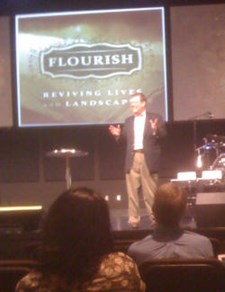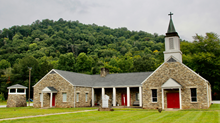
Last week, evangelical creation care entered a new phase as key pastors, scientists, and thought leaders gathered near Atlanta for a "coming out party." That's what Jonathan Merritt called the gathering as he welcomed conferees to Flourish 09, hosted by Cross Pointe Church where Merritt serves on the staff with his father, senior pastor and former president of the Southern Baptist Convention James Merritt.
Like all debutantes, the leaders of Flourish were clearly self-conscious as they tried to forge a new identity in public for the first time. Flourish president and co-founder Rusty Pritchard was the first of many to declare, "I am not an environmentalist." For Pritchard, a natural resources economist who founded the environmental studies program at Emory University, that label is loaded with overtones of judgmentalism and apocalypticism. We don't need environmentalism for us to be perceived as judgmental, said Pritchard. If you want judgmentalism, "just come to my church."
What emerged from Pritchard's keynote talk was not a passion for the environment so much as a passion for people, their health and well-being, and particularly for social justice. If our abuse of the environment raises, for example, the rate of debilitating asthma attacks, then it is a compassion issue for the church.
It's not about recycling and reusing, said Pritchard, it's about clean water and clean air. It's about social justice.
What Pritchard was keen to avoid–what Flourish is keen to avoid–is polarizing environmental rhetoric, rhetoric borrowed on the Right from Sean Hannity and on the Left from Al Gore. "Our engaging with environmental issues doesn't need to start with politics," said Pritchard. "That is the thesis of this conference. We have to start somewhere other than climate politics. There is nothing more divisive."
And so the conference proceeded largely without a lot of attention to climate change politics and its attendant apocalypticism. The only exception was an illustrated lecture by National Wildlife Federation president Larry Schweiger, who let loose a fusillade of climate data, which likely overwhelmed rather than enlightened most in attendance.
* * ** * ** * *
Perhaps the biggest benefit of the conference was its line-up of pastors talking to pastors about how to promote environmental concern in their congregations without creating factions.
South Atlanta pastor Leroy Barber spoke of how his church worked to "green my 'hood." His parishioners live with all the unsightly and unsanitary things other Atlanta neighborhoods avoid: chemical plants, an auto impound lot from another municipality, a landfill, poor public transportation. He described his church's efforts to improve the lives of their neighbors through economic development, health and nutrition programs, and even pedestrian safety campaigns. "That's good news for the poor," he said.
Orlando pastor Joel Hunter talked about how he has worked to weave creation care into the general discipleship experience of those he ministers to. Hunter admonished those present to attach everything they do to Scripture, to present facts rather than clever opinions, and to tell stories of environmental action that illustrate and invite Christians to demonstrate neighbor love.
Boise, Idaho, Vineyard pastor Tri Robinson positioned himself as a regular guy: a rancher and a hunter and an evangelical pastor, he says. He doesn't wear Birkenstocks. If you're going to succeed in getting people like me to engage with creation care, said Robinson, you're going to have to do three things:
* show me it is biblical and right,
* show me why it is going to be good for my church,
* connect it to the kingdom of God (Isaiah 61 via Jesus' words in Luke 4:14ff).
Castle Rock, Colorado, pastor Rand Clark spoke about integrating creation care activities into church planting and evangelism.
Houston pastor Chris Seay promoted creation care as way to free ourselves from slavery to Mammon and materialism.
Host pastor James Merritt preached a model sermon setting forth the biblical case for creation care. It was Merritt's first sermon ever on the topic, and he was laying the foundation not only for the preaching of other pastors but his own teaching ministry as well.
Evangelicals have often criticized the environmental movement for worshiping the creation rather than the Creator. At Flourish 09, there was not the slightest hint of nature mysticism. The dominant spiritual message was the need for neighbor love and the social justice activity neighbor love entails.

A number of social justice ministries were represented at the conference. The most popular booth belonged to Land of a Thousand Hills Coffee, with its slogan–"Drink Coffee. Do Good."–and its endless urns of really good joe. The ministry helps Rwandan genocide survivors to form coffee-growing co-ops, then helps them speed their best beans to market where they command top prices. These co-op farmers typically increase their revenues by a factor of 4.5, exceeding the prices paid in fair-trade programs. Land of a Thousand Hills markets their product to and through churches.
Floresta told how its tree-planting efforts rehabilitate the soil and water sources that rural people need to live. (Watch for an upcoming Christianity Today article on Floresta's work on the Haiti-Dominican Republic border.)
Pastor Tri Robinson put it bluntly: "Not caring about the creation is killing people." The clear message of the conference: restoring creation restores life, restores people to health, and demonstrates Christian love.
Previously: "Can We Separate Creation Care from Political Action?"
Tomorrow: "The Creator, Not the Crisis: The Theology of Flourish"

Support Our Work
Subscribe to CT for less than $4.25/month




















